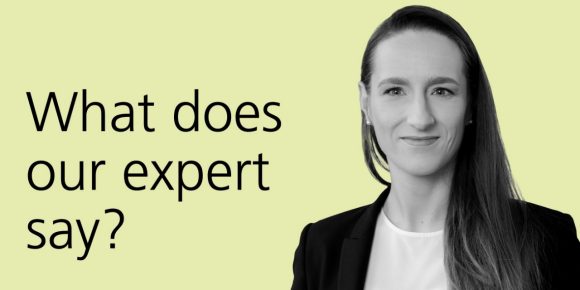What does our expert say?
The importance of private retirement savings
“Why are private pensions so important for women?” Our pension expert Jackie Bauer answers a question we keep on being asked.

![]()
header.search.error
What does our expert say?
“Why are private pensions so important for women?” Our pension expert Jackie Bauer answers a question we keep on being asked.

Let me begin with a question: “Who doesn’t want to keep enjoying their current standard of living after they retire?” Your pillar 1 and pillar 2 pensions often won’t be enough, especially for you as a woman. As you may know from your own experience or that of female colleagues, we often work part time and are more likely to take career breaks, which is why our retirement savings are often lower. Given these circumstances, and due to our earlier retirement age and longer life expectancy, we cannot really look forward to a long retirement without taking countermeasures – indeed the reverse is the case.
Private retirement savings will help you enjoy a financially independent retirement. To achieve this, it’s important for us women to save enough for our retirement during the “active” phase of our lives. So how can you use the different options for setting up a private pension so you can look forward to a worry-free retirement?

Expand your financial knowledge
Would you like to learn more about “Retirement”? Then subscribe to our “Retirement” learning path today.
How to invest in a private pension
The answer often starts with the timing: when do I need to start planning for retirement? I can only say that it’s never too late, but also never too early. The sooner you start saving, the more flexibility you’ll have later on, and the better you can react to sudden, unexpected changes.
If you haven’t yet invested in a private pension – or only invested very little – you shouldn’t think that it’s not worth doing so, whatever your age. The worst decision you could make would be not to invest at all in a private pension.
First, invest in pillar 3a. A monthly standing order will make saving easier, and you’ll be surprised at the total generated from regular contributions, even if they are small. You also get tax relief on pillar 3a contributions. Our tax savings pension calculator can help you calculate the level of contribution appropriate for you.
Next, check your pillar 1 (AHV) and pillar 2 (pension fund) accounts for any gaps. You can make up for any shortfalls with voluntary contributions (for the AHV, only within a five-year period). This is worth doing not just with a view to your retirement, but due to tax savings too. Use our pension calculator to identify any gaps.
The worst decision you could make would be not to invest in a private pension at all.
Especially in times of low interest rates, you should think of investing your money. If your investment horizon is longer than 10 years, it’s worth investing in pension funds with a relatively high equity component, for example. Stock prices often fluctuate wildly, as they are currently. But in the long term they offer better potential returns. If you are already quite close to retiring, it’s worth diversifying the risk and reducing the equity component.
Let’s tackle this together
We women may not like to admit it, but we all know we find making certain decisions difficult. Especially when it comes to pensions and finances, we are often unsure whether to invest, and if so, how. But it’s best to start with baby steps than not to start at all. Financial topics such as planning for your retirement are a learning process.
As mentioned above, start with regular deposits into pillar 3a and then gradually learn more about the topic. There are lots of different ways to save for your retirement, so there is an individual pension solution for everyone. In order to find the right solution for you, I recommend that you use the support of a consultant – to guide you on your way.
I also recommend you consult the information about pension planning on the Women’s Wealth Academy site. Here you’ll find, for example, suggestions for your personal retirement planning.

Stay informed
Would you like to receive regular news and updates from the Academy? Subscribe to the Women’s Wealth Academy newsletter.
Because a personal conversation is worth a lot
What can we do for you? We’re happy to address your concerns directly. You can contact us in the following ways: